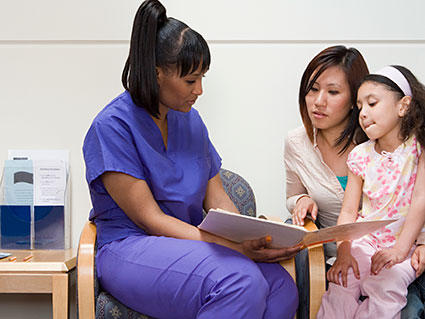Clinical Genetics Branch Research Areas
Clinical Genetics Branch investigators conduct clinical, genetic, and epidemiologic studies of individuals at high risk of cancer in order to improve our understanding of cancer etiology and to advance clinical care.
Clinical Genetics Studies
CGB investigators conduct etiologic studies of individuals and families at increased risk of cancer to discover new cancer susceptibility or risk-modifying genes, to understand better the molecular pathogenesis of specific disorders, and to investigate possible genotype/phenotype relationships that will improve clinical management and aid in genetic counseling.
Familial Testicular Cancer Study
A study of the genetic causes of testicular cancer and the role of testicular microlithiasis (calcium deposits within testicular tissue) and risk of familial testicular cancer.
Fanconi Anemia Cancer Screening Study
The Fanconi Anemia Cancer Screening Study seeks to improve cancer screening in people with Fanconi anemia (FA), the most common Inherited Bone Marrow Failure Syndrome (IBMFS). The study is enrolling new participants.
Inherited Bone Marrow Failure Syndromes
IBMFS are a group of rare genetic blood disorders. CGB investigators are leading a clinical study to better understand how cancers develop in persons with these disorders.
Li-Fraumeni Syndrome (LFS) is a rare, inherited disorder which leads to a higher risk of certain cancers. NCI has evaluated families with LFS since the syndrome was first recognized in 1969. DCEG is now expanding this research through a clinical study and participation in a multi-institutional collaboration.
Myotonic Dystrophy and Cancer Susceptibility
Studies of cancer phenotype in the inherited nucleotide repeat neuromuscular disorder Myotonic Dystrophy (DM).
Neurofibromatosis Type 1
Studies of Neurofibromatosis Type 1 to identify the additional genes that influence the wide variations in phenotype by applying the principles of translational medicine.
Osteosarcoma Studies
Genetic and descriptive studies of osteosarcoma, a primary bone cancer of adolescents and young adults.
Pleuropulmonary Blastoma DICER1 Syndrome Study
An observational study of children with Pleuropulmonary blastoma (PPB), a rare tumor of the lung that may be part of an inherited cancer predisposition syndrome caused by changes in DICER1.
Predictors of Outcomes after Allogeneic Hematopoietic Cell Transplantation
A study to identify predictive biomarkers of clinical outcomes in patients receiving allogeneic hematopoietic cell transplantation.
Psychosocial Effects of Cancer Predisposition Syndromes
CGB investigates and defines best practices of medical, psychosocial, and genetic counseling, as well as risk assessment and communication, to counsel and care for at-risk individuals and families.
Waldenström's Macroglobulinemia Study
A study of the rare tumor, Waldenström's macroglobulinemia (WM), to determine what causes WM to sometimes develop in two or more family members.
Telomere Molecular Epidemiology
Studies of nucleoprotein structures designed to protect the ends of chromosomes and are critical to chromosome stability. Research covers characterization of telomere length as a cancer risk factor and identification of genetic determinants of telomere length.
Clinical Epidemiology Studies
CGB investigators in the Clinical Epidemiology Unit (CEU) study the molecular etiology of various cancers in order to identify at-risk individuals in the general population. They seek to translate our research findings into improved clinical practice and management.
- HPV-related anogenital cancers
- Endometrial cancer
- Ovarian Cancer
- Oropharyngeal Cancer
- Oral cavity cancer
- Lung Cancer
- Clinical Epidemiology Methods
Read more about the Clinical Epidemiology Unit Research.
Biomarker Evaluation and Absolute Risk Prediction
CGB investigators, in collaboration with investigators from the Biostatistics Branch (BB), are developing methodologies and tools to be used for biomarker discovery and evaluation, as well as risk stratification analysis.
